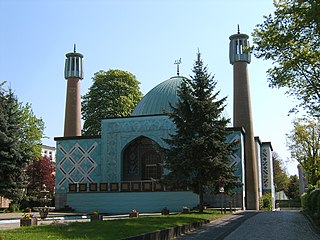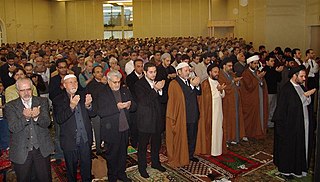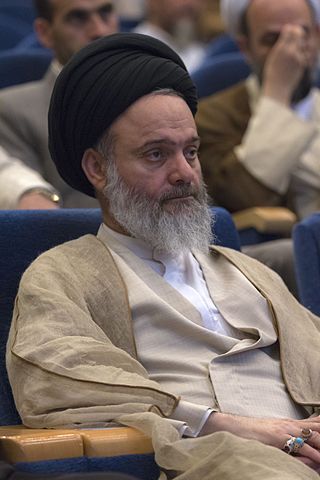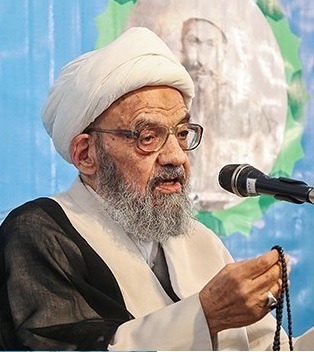Related Research Articles

ʿAlī al-Ḥusaynī al-Sīstānī is an Iranian-born Iraqi Islamic scholar. A Grand Ayatollah and marja, al-Sistani is considered the leading religious leader of Twelver Shia Muslims.

The Islamic Centre Hamburg, also known as the Blue Mosque, was the oldest mosque in Hamburg, Germany, being established in the late 1950s by a group of Iranian emigrants and business people and built in the early 1960s. Amid investigations regarding its ties with Iran and Hezbollah, the IZH was judged unconstitutional and closed by the German government in July 2024.
The Shia clergy are the religious leaders of Shia Islam. Shia Islam places great importance on the guidance of clergy, and each branch of Shi'ism maintains its own clerical structure. The most well-known Shia clergy belongs to the largest branch of Shia Islam, Twelver Shi'ism. As in other branches of Islam, Shia scholars are collectively known as the ulema. Individual clerics are referred to as mullah or ākhūnd, but because those terms have developed "a somewhat pejorative connotation" since at least the 1980s, the term rūḥānī has been "promoted" as an alternative, "especially by the clerical class itself".

Grand Ayatollah Mohammad Ebrahim Jannaati is an Iranian Twelver Shia Marja. He has studied in seminaries of Qom and Najaf. He is known for his progressive fatwas on women and youth issues, such as:

Grand Ayatollah Mohammad-Taqi Bahjat Foumani was an Iranian Twelver Shia Marja'.

Lotfollah Safi Golpaygani was an Iranian Grand Ayatollah. He was at one point the most senior Twelver Shia scholar (Marja') in Iran until his death. He resided in Qom and taught Islam in the Qom Seminary.

Grand Ayatollah Hossein Noori-Hamedani is an Iranian Twelver Shi'a Marja known for his conservative views.

Khomeinism, also transliterated Khumaynism, refers to the religious and political ideas of the leader of the 1979 Iranian Islamic Revolution, Ruhollah Khomeini. In addition, Khomeinism may also refer to the ideology of the clerical class which has ruled the Islamic Republic of Iran, founded by Khomeini. It can also be used to refer to the "radicalization" of segments of the Twelver Shia populations of Iran, Iraq, and Lebanon, and the Iranian government's "recruitment" of Shia minorities in Afghanistan, Pakistan, Saudi Arabia, and Africa. The words Khomeinist and Khomeinists, derived from Khomeinism, can also be used to describe members of Iran's clerical rulers and attempt to differentiate them from "regular" Shia Muslim clerics.

Ali al-Kourani was a Lebanese Shia scholar cleric. He was born in 1944 in Yater (Lebanon) In Jabal Amel, migrating to Najaf, Iraq to study in a hawza in 1958.

Ayatollah Ata'ollah Ashrafi Esfahani was an Iranian religious leader. He was born near Esfahan and educated in Esfahan and at the Qom Seminary. He became a mojtahed when he was 40. After the Islamic Revolution of 1979, he was selected as the Imam Jumu'ah for the city of Kermanshah. He was killed during Friday prayer on 15 October 1982.

Shia Islam in Canada is a part of the global Shia community that continues to bond with Shias elsewhere. Shia Muslims have been a featuring segment of the Canadian Muslim society that became more conspicuous from the 1970s and onwards.
Marja' is a title given to the highest level of Twelver Shia religious cleric, with the authority given by a hawzah to make legal decisions within the confines of Islamic law for followers and clerics below him in rank. The highest ranking marjiʿ is known as the marja al-mutlaq or marja al-taqlid al-mutlaq. A marji' is usually also a grand ayatollah.

The Najaf Seminary, also known as the al-Hawza Al-Ilmiyya, is the oldest and one of the most important Shia seminaries (hawza) in the world. It is located near the Imam Ali Shrine in the city of Najaf in Iraq, and also operates a campus in Karbala, Iraq. It was established by Shaykh al-Tusi, and continued as a center of study after the establishment of modern Iraq in 1921.

A fatwa prohibiting the insulting of the most religious figures of Sunni Islam was published by Iran's Supreme Leader, Ali Khamenei, on 30 September 2010. The fatwa was issued following the insulting of Aisha by Yasser Al-Habib. This fatwa received various reactions from Shia and Sunni Muslims, and from Arabic and Western media.

Sayyid Fadhil al-Hosseini al-Milani was an Iraqi-Iranian Shia academic, author and community leader. Al-Milani was the appointed representative of the late grand Ayatollah Abul Qasim Al-Khoei in the United Kingdom since his arrival in 1986, and was accredited on behalf of grand Ayatollah Ali al-Sistani.

Seyyed Hashem Hosseini Bushehri is an Iranian Twelver Shia cleric who was born in 1956 in Bandar-e Deyr, Bushehr province. Hosseini Bushehri is the representative of Bushehr province in the Assembly of Experts; he is also the Temporary Imam of Friday Prayer in Qom.

Reza Ramezani is a Twelver Shia Muslim cleric with the religious Rank Ayatollah. He has been a member of the Expert Council in the Islamic Republic of Iran since 2006. From 2009 to August 2018, he was head and director of the Islamic Center Hamburg, the center of Shiite Islam in Germany. Before working in Hamburg, he headed the Islamic Center Imam Ali Vienna. He is the Secretary-General of the Ahl Al-Bayt World Assembly and the representative of Gilan in the Assembly of Experts. Between 2001 and 2005, he represented the Supreme Leader and the Friday Imams in Karaj.

Sheikh Ahmad Mohseni Garakani Persian: شیخ احمد محسنی گرکانی, is an Iranian Ayatollah. He was the Imam of Friday Prayer in Tuyserkan and the Chief of the Supreme Court of Iran, as well as representing the people of Markazi province in the Assembly of Experts from 1998 to 2024.
References
- ↑ "List of Maraji in Arabic". Archived from the original on 2012-11-02.
- ↑ "نعمت اللهیه کوثریه ظهورعلیشاهیه". baktashienews.blogsky.com.
- ↑ مراجع و فقهاى حاضر
- ↑ Islamopedia [ permanent dead link ], Ayatollah Hosseini Nassab.
- 1 2 Management biographies Archived 2012-07-30 at the Wayback Machine , Islamic Centre Hamburg.
- ↑ About Archived 2010-02-08 at the Wayback Machine .
- ↑ "Change of leadership in the "Islamic Center of Hamburg" Archived 2009-07-03 at the Wayback Machine , www.hamburg.de, 20 January 2004.
- ↑ Achievements, Seyed Reza Hosseini Nassab's official website.
- ↑ New Fatwas, Seyed Reza Hosseini Nassab's official website.
- ↑ New Fatwas, Seyed Reza Hosseini Nassab's official website.
- ↑ New Fatwas, Seyed Reza Hosseini Nassab's official website.
- ↑ New Fatwas, Seyed Reza Hosseini Nassab's official website.
- ↑ New Fatwas, Seyed Reza Hosseini Nassab's official website.
- ↑ Autobiography, Seyed Reza Hosseini Nassab's official website.
- ↑ Books of Ayatollah Hosseini Nassab Seyed Reza Hosseini Nassab's official website.